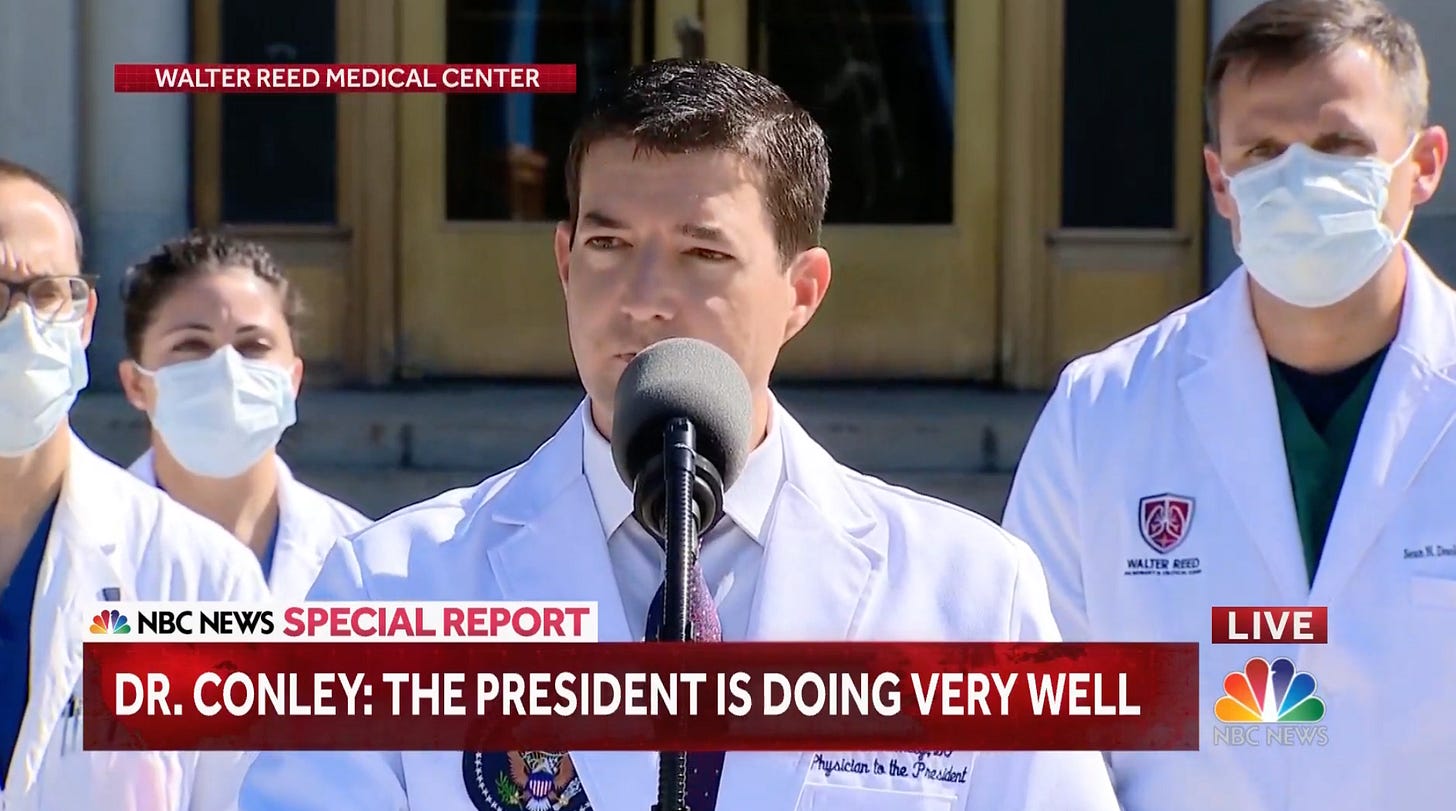Why Should Anyone Trust Them?
The skepticism around Trump's COVID saga shows what happens when people are constantly lied to.

Donald Trump announced he had coronavirus shortly before 1 a.m Friday. Within minutes, people started expressing straight-up disbelief. Can you blame them?
Considering that the news of Trump’s diagnosis (and subsequent hospitalization) is so recent, there has been limited polling about Trump and COVID in the wake of his announcement. Hopefully, some enterprising pollster decides to ask people if they actually believe Trump or not, because there seems to be a lot of this:


It’s not just people on Twitter. From Politico:
"My initial instinct was he’s lying about this diagnosis," said Rebekah Nagler, a University of Minnesota professor who has a forthcoming paper that addresses Trump's conflicting claims on coronavirus. "And I don’t think I’m the only person who felt that way," Nagler said, hastening to add she no longer doubted he had actually come down with the disease.
These reactions all stem from the same core problem: Trump has shown a willingness to lie about everything, right in our faces, day in and day out for the past five years, and he rarely acts in a way that doesn’t glorify himself.
The president has a disease that’s infected more (and probably much more) than 7 million people in the United States alone and killed more than a million people worldwide. Considering the infection rate and the White House’s militant opposition to following CDC guidelines, it was very feasible that Trump was eventually going to test positive; now that Trump has been hospitalized, it’s likely you’ll see less and less speculation that he’s making it up.
It seems very clear that Trump does have COVID. But I can’t actually blame anyone for instinctively thinking, upon hearing the news, that something was up. I also won’t blame anyone for not trusting what we hear from the White House about Trump’s ongoing health situation, especially since his team continues to dodge transparency. On Saturday, for instance, his doctor, Sean Conley, told reporters Trump was doing “very well,” but was remarkably evasive about whether or not he had ever needed oxygen (turns out he had), offered confusing and alarming possible details about the timeline of Trump’s illness that the White House later tried to clean up, and refused to give any specifics about the fever Trump had contracted or when Trump’s last negative COVID test had taken place. White House reporters were then passed this nugget along by an anonymous administration source:

What in the world is going on?
This was always the problem with having a president for whom lying is as natural as breathing. The vast majority of politicians lie and obfuscate the truth, of course, which is partially why we ended up here in the first place.
But usually, power saves the lying for big things, like selling a war in Iraq and that we can’t afford to give everyone healthcare, and goes to great lengths to make a case for why we should believe them. Trump lies about things that are demonstrably false for anyone who knows how to use Google. He lies about things he said almost immediately after saying them. He lies to people to their face to beat them at golf. He brings people into his orbit who are willing to lie for him.
He lies about all of these things and more, and he really doesn’t give a shit whether or not you believe him. No one except his most fervent supporters believes him. He has already admitted to lying about the severity of the coronavirus. His administration hid the extent of the initial COVID outbreak within its ranks this week. Now that we’ve been thrust into yet another political crisis, is it any wonder people don’t immediately assume that this time, really, the Trump White House can be trusted to tell the truth?
History has shown that this sort of complete distrust in the word of a country’s leadership is kindling for unrest and revolt. In the 1770s, after decades of the French monarchy abandoning its responsibility to alleviate hunger during famines, an early experiment in the glorious free market drove the price of grain sky high and helped lead to food shortages.
Rather than believing this to be the comical ineptitude of bureaucrats who would either flee or get their heads chopped off over the come years, the idea that elites were actually just hoarding the grain became pervasive and let to a wave of riots that is now known as the Flour War. A little more than a decade later, the country was engulfed in revolution.
It goes without saying that hunger wasn’t the main cause of the French Revolution and that the U.S. in 2020 is not France in the 1770s, even if widespread hunger is one of the most underrecognized and underreported problems in America right now. But it’s more than reasonable to believe that it’s just a question of when, not if, there will eventually be a reckoning with the fact that so few people trust the government’s line or ability to perform basic services that it effectively loses its mandate altogether. And no matter what happens, the kind of president and kind of person Trump is has undoubtedly accelerated that process.






Something about a boy crying wolf.
AP reported that "concerning vitals" quote is from COS Meadows, too, which just makes it yet more insane. is Meadows at odds with Trump?? not to mention the most recent statement from Dr. Conley incorrectly spells Regeneron, misattributes a statement to himself, and isn't signed by anyone?? hard to imagine they could handle this any worse than they are.